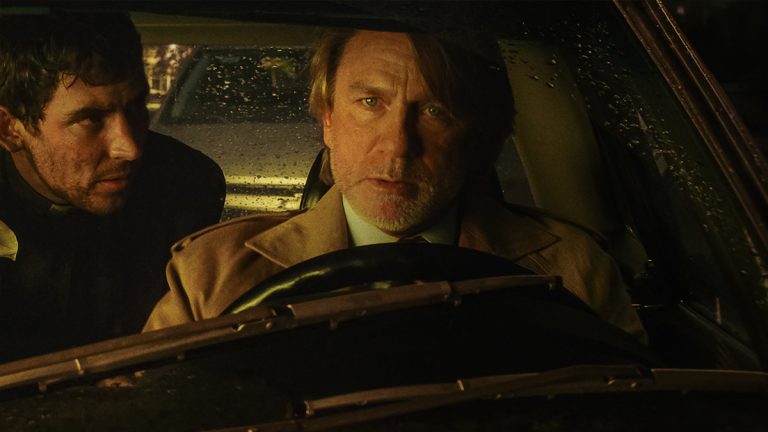“It’s not witchcraft… What matters is the sincerity of your devotion.”
In “The Phoenician Scheme,” Liesl (Mia Threapleton) tells her arms-dealer father, Zsa-zsa Korda, this aboard his private jet. It feels like classic Wes Anderson. Quirky. Precise. A nun advising a tycoon. Yet, beneath the pastel surfaces and deadpan delivery, something deeper stirs. Wes Anderson plunges us into a world where billionaires play basketball for billion-dollar deals and celestial courts judge earthly sins. Imagine “Succession” filtered through a kaleidoscope, then dropped in a war zone. The usual Anderson whimsy feels charged, dangerous even. What kind of reckoning is brewing in Phoenicia?
Wes Anderson peppers his latest with revolutionaries. Picture Richard Ayoade, gaunt in tweed, railing against “bourgeois exploitation.” His Marxist fervor is passionate. However, it also seems hilariously impotent. His grand speech happens amidst candy-colored dioramas. Anderson’s signature whimsy turns serious critique into a toy rebellion.
Furthermore, this fiery communist’s significance seems to vanish after one scene. His revolution? Merely a fleeting sideshow to Korda’s globe-trotting greed. The spectacle of wealth effortlessly swallows the cry for worker solidarity. Truly, the revolution will not be televised; it might not even get a second scene. But Wes Anderson serves both faith and revolution with a heavy dose of skepticism. Faith is no pure savior.
Faith’s Flawed Frontline
Liesl, the nun-in-training, embodies sincere devotion. But her struggle is real: can she truly weaponize prayer against her tyrant father? Time noted this tension. More critically, Wes Anderson highlights faith’s hypocrisies. Liesl can’t refuse her monstrous inheritance—material wealth contradicting her vows of poverty. The nun who expels her for worldliness readily accepts Korda’s massive check for the Church.
Religion, the film suggests, is deeply entangled with the material world it often claims to transcend. Korda’s near-death vision of a celestial courtroom brilliantly lampoons this, merging divine judgment with the cold bureaucracy of a corporate boardroom. Yet, here’s Anderson’s central irony.
Despite their flaws and compromises, it’s faith, not the apparently vanished communist ideology, that catalyzes tangible disruption within Korda’s empire. Faced with divine bureaucracy and damnation, Korda’s eventual pivot—converting to Catholicism and vowing to “pay his workers properly”—is astonishing. Is it genuine atonement? Or a cynical, last-ditch PR move cloaked in ritual (incense, choirs, confession booths)? Anderson leaves it deliciously ambiguous.
The point is the impact: this faith-driven act, however messy or self-serving, directly attacks his capitalist foundation—paying fair wages—in a way the revolutionary’s rhetoric never could. Sincere or not, it unsettles the system.
This doesn’t champion faith; it highlights a perverse effectiveness. The film posits that within this corrupted world, the personal crisis of faith and mortality (Korda fearing hell) proves a more potent catalyst for material change against capitalist excess than the collective, but ultimately ignored, revolutionary ideal.
The communist critique remains valid, yet inert within the narrative. Faith, riddled with its own contradictions and commodification, ironically becomes the operational tool for disruption. Wes Anderson shows us a world where neither pure ideology nor pure devotion wins, but where the messy, compromised performance of faith accidentally strikes a blow the earnest revolutionary could not.
Satire of Excess & Imbalance
The film skewers real excess. Korda’s “Phoenician scheme” involves slave labor and manufactured famines. His sprawling estate houses nine sons, potential heirs in a grotesque lottery. Yet, he chooses his daughter (who is biologically his niece). Lavish rituals abound: grenades presented like chocolates, reagent-laced drinks, high-stakes basketball games deciding fortunes. It’s capitalism as curated farce. Anderson juxtaposes this with the revolutionaries’ inability and faith’s moral compromises, creating a complex satire where all systems are flawed.
However, Anderson’s narrative invests disproportionately in faith’s journey, making it the film’s overarching engine from start to finish, while the communist voice remains a potent but brief interruption.
Wes Anderson masterfully contrasts these forces. The communist’s critique is potent but vanishes into the ether after a single scene. Liesl’s faith is sincere but compromised by materialism and institutional hypocrisy, yet it drives the central familial and moral conflict. Korda’s conversion, suspect as it may be, becomes the narrative climax, forcing concrete action.
His near-death experience, filtered through divine bureaucracy, becomes the unlikely engine for material change. The system isn’t cleanly overthrown by theory or purified by grace. It’s messily jolted by a tycoon’s terrified, self-interested grasp at salvation framed entirely through the lens of faith. Anderson, in one of the scenes, even explores this dichotomy of faith and Marxism:
The Communist Revolutionary (studying Liesl): “Religion is the sigh of the oppressed creature. It’s a protest against suffering.”
Liesl (voraciously): “I agree. You’re not an atheist.”
Revolutionary (stiffening): “Of course, I am!”
He glances pointedly towards a comrade nearby. The comrade stands before a cross, bewildered, hands subtly tracing a ritual gesture.
Revolutionary (with a bit of disdain): “…But some of my colleagues? They only claim to be.”
Besides, Anderson suggests that the most disruptive acts against crony capitalism, within this specific story, emerge from deeply personal, morally ambiguous spiritual crises, not collective political action.
Wes Anderson’s Ironic Disruption: A Grotesque Cycle
The conclusion feels subversively accidental. Korda’s faith-driven decision to pay workers fairly is the film’s tangible revolt. It directly enacts the material justice that the communists desired but failed to achieve in the movie. This act holds disruptive power precisely because it targets his capitalist core from within. Anderson posits that confronting mortality and navigating corrupt institutions can, ironically, dismantle greed more effectively (though not more purely) than ignored political theory. It’s a deeply personal, morally murky uprising.
This resonates with biting irony now. In an era of performative philanthropy and unchecked power, Korda’s clumsy conversion stings. Is paying a living wage truly such a revolutionary, heavenly-demanding act? Anderson highlights the absurdity of our normalized excess. His celestial courtroom underscores a simple truth echoing the film: wealth cannot buy passage past the needle’s eye. True change requires sacrifice, which capitalism rarely entertains, delivered here through compromised faith, not pristine ideology.
Opium for the Oppressor
Ultimately, “The Phoenician Scheme” isn’t about faith’s triumph or communism’s failure. It’s a satirical exploration of flawed tools against a corrupt system. Marx provides the critique rendered impotent by spectacle. Faith offers a path riddled with hypocrisy, yet, in Anderson’s ironic hands, accidentally delivers the material disruption. Korda’s empire isn’t toppled by the proletariat or saved by saints. It’s unsettled by a nun’s conflicted devotion and a sinner’s fear,
wrapped in the director’s signature style. The revolution is not collectivized or holy; it’s internalized, compromised, and startlingly practical. The final irony lingers. In seeking personal salvation (or avoiding damnation), Korda enacts the material change that aligns with the revolutionaries’ abandoned dream. He becomes a worker himself.
Anderson visualizes this evasion through a grotesque cycle of social descent. The oligarch who once held court in marble baths while servants orbited him like planets completes his “redemption” not in a boardroom or cathedral, but in a humble restaurant. Here, Korda washes dishes and serves food—labor mirroring his childhood drudgery.
This reset is no ascetic enlightenment; it’s a perverse homecoming. The man who built empires on slave labor now performs proletarian authenticity. The film implies this is capitalism’s ultimate irony: even when the mighty fall, they merely rotate roles within the same broken system. As the revolutionaries’ critique fades unheard, Korda’s performance of penance becomes the only “revolution” on offer—a theatrical downcycling where power changes costumes but the stage remains unchanged.
His faith, however impure, becomes the accidental, practical revolt. Yet Marx’s assessment of religion resonates profoundly here: it remains “the sigh of the oppressed creature, the heart of a heartless world, and the soul of soulless conditions. It is the opium of the people.” Korda, the ultimate oppressor, now becomes the sighing creature, using faith as opium to numb his terror of damnation while evading systemic accountability.
His conversion is less enlightenment than desperation, a capitalist co-opting spiritual anesthesia to endure his own moral reckoning. As Oscar Wilde observed, “Life imitates art far more than art imitates Life.” The path through the needle’s eye isn’t transcendence but farce—paved with compromise, haunted by failed revolutions, and lit by the flickering neon of a diner where tycoons play at being workers. In this world, Marx’s “opium” doesn’t just soothe the oppressed; it anesthetizes the oppressor’s guilt.




![A Ghost Story [2017]: Sundance Film Festival Review](https://79468c92.delivery.rocketcdn.me/wp-content/uploads/2017/01/a-ghost-story-768x578.jpg)



